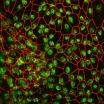"The use of natural dietary products with anti-tumor activity is an important and emerging field of research," says senior author Hafiz Ahmed, Ph.D., assistant professor of biochemistry and molecular biology at the University of Maryland School of Medicine and scientist at the Institute for Marine and Environmental Technology (IMET). "Understanding how these products work could allow us to develop foods that also act as cancer therapeutics and agents for immunotherapy."
Most people who succumb to cancer die because tumor cells invade the surrounding tissue and migrate into the nearby blood and lymph vessels, a process known as metastasis. For example, prostate cancer typically spreads to the bones, lungs and liver. Cancer cells that metastasize to other parts of the body grow new blood supplies and eventually overcome the person's organ systems.
"This study is among the first to explore the therapeutic utility of a bioactive cod TFD-containing glycopeptide to inhibit prostate cancer from progressing," says Dr. Ahmed, who also is affiliated with the University of Maryland Marlene and Stewart Greenebaum Cancer Center. The TFD (Thomsen-Friedenreich disaccharide) antigen in the fish protein is hidden in normal human cells but is exposed on the surface of cancer cells and is believed to play a key role in how cancer spreads.
Polar fish, such as northern cod, express glycoproteins that are rich in the TFD antigen, which protect them from freezing. The research team developed a special form of TFD, called TFD100, purified from Pacific cod.
Using animal models, the researchers found that TFD100 binds to galectin-3, a protein that is overexpressed in prostate cancer cells, and blocks its interaction with the TFD antigen found on the surface of the cells. Galectin-3 (gal3) enables cancer cells to adhere to the walls of blood vessels and also kills activated T-cells, a type of white blood cell, which helps the cancer cells to spread throughout the body and evade the immune system. The researchers observed that TFD100 prevents cancer cells from attaching to the vessel walls, suppresses T-cell death and boosts the immune response.
"Because the gal3-TFD interaction is a key factor driving metastasis in most epithelial cancers, this high-affinity TFD100 should be a promising anti-metastatic agent for the treatment of various cancers, including prostate adenocarcinoma," the researchers conclude in the study, which was published online March 11 in PNAS' Early Edition.
"This research breaks new ground in our ongoing quest to discover new ways to prevent cancers from metastasizing to distant parts of the body," says E. Albert Reece, M.D., Ph.D., M.B.A., Vice President for Medical Affairs at the University of Maryland and the John Z. and Akiko K. Bowers Distinguished Professor and dean of the University of Maryland School of Medicine. "If we could one day offer patients a natural dietary supplement, derived from fish proteins, which could help to block that process, we could have a significant impact on improving patients' outcomes and survival."
Co-investigator Dhan V. Kalvakolanu, Ph.D., a professor of microbiology and immunology at the School of Medicine, notes that additional research is needed to develop a dietary supplement from the cod peptide that could complement chemotherapy and other standard treatments. "No single drug on its own is going to offer protection against advanced cancers. We need a multi-pronged approach to successfully treat this disease," he adds.
The study was conducted by researchers from Dr. Ahmed's laboratory, in collaboration with Dr. Kalvakolanu and other investigators at the University of Maryland Greenebaum Cancer Center and the IMET. Prasun Guha, Ph.D., a postdoctoral fellow in Dr. Ahmed's laboratory, was the study's lead author.
###
The research was funded by grants from the National Institutes of Health (CA133935, CA141970, GM070589, CA105005), the U.S. Army Medical Research and Materiel Command, the Council of Higher Education (Turkey) and the University of Maryland start-up fund.
About the University of Maryland School of Medicine
Established in 1807, the University of Maryland School of Medicine is the first public medical school in the United States, and the first to institute a residency-training program. The School of Medicine was the founding school of the University of Maryland and today is an integral part of the 11-campus University System of Maryland. On the University of Maryland's Baltimore campus, the School of Medicine serves as the anchor for a large academic health center which aims to provide the best medical education, conduct the most innovative biomedical research and provide the best patient care and community service to Maryland and beyond. http://www.medschool.umaryland.edu.
About the University of Maryland Marlene and Stewart Greenebaum Cancer Center
The University of Maryland Marlene and Stewart Greenebaum Cancer Center is a National Cancer Institute-designated cancer center, which is part of the University of Maryland Medical Center and the University of Maryland School of Medicine. The center is recognized for its active clinical and basic science research program. It has comprehensive programs to treat all types of cancer and is a major referral center for patients throughout Maryland and the region. It has been recognized as one of the top 15 cancer centers in the nation by U.S. News & World Report in 2012-13. For more information about the center, go to http://www.umgcc.org.
About the Institute for Marine and Environmental Technology
IMET is a joint University System of Maryland research institute capitalizing on the strengths of the University of Maryland Center for Environmental Science, the University of Maryland Baltimore County and the University of Maryland Baltimore. IMET utilizes the research, training and technology transfer capabilities of these partner institutes to further its mission. The scientists at IMET conduct marine and environmental research and thereby create technologies designed to foster the protection and restoration of coastal marine systems and their watersheds, sustainable use of their resources and improvement of human health. For more information about the center, go to http://imet.usmd.edu.
Cod glycopeptide with picomolar affinity to galectin-3 suppresses T-cell apoptosis and prostate cancer metastasis
Prasun Guha, Engin Kaptan, Gargi Bandyopadhyaya, Sabina Kaczanowska, Eduardo Davila, Keyata Thompson, Stuart S. Martin, Dhananjaya V. Kalvakolanu, Gerardo R. Vasta, and Hafiz Ahmed
END

